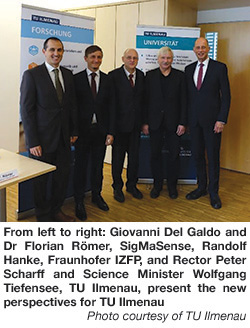TU Ilmenau and Fraunhofer IZFP develop intelligent sensor technology for processing big data
06/02/2020
The Ilmenau University of Technology (TU Ilmenau) is intensifying its research efforts in order to master the rapid increase in data during the course of digitisation. The novel idea for ‘intelligent’ sensors is to record required data for the respective work process at an early stage and thus reduce the quantity to be processed. In order to achieve its ambitious research objectives, TU Ilmenau is planning a new professorship in collaboration with Fraunhofer-Gesellschaft, which in turn will intensify the activities of its established research group ‘SigMaSense’ (signal processing for material data acquisition using smart sensors). The Free State of Thuringia is supporting these activities this year with €150,000 (approximately £128,000). On 21 October 2019, Wolfgang Tiefensee, Thuringia’s Science Minister at TU Ilmenau, also announced further support for the expansion of the research group and its establishment as a branch office of the Fraunhofer Institute for Nondestructive Testing IZFP in Saarbrücken, with a total of up to €2.4 million (approximately £2 million) from 2021.Conventional data processing methods capture all of the available data, often resulting in highly redundant measurement signals that then have to be evaluated in a further step. This not only calls for high expenditure but, in most cases, only a small portion of the accumulated data material is needed for the respective work process. Since the beginning of 2018, SigMaSense has been working on novel methods for obtaining intelligent data. The new approach only allows the sensor to record what is actually needed. Dr Florian Römer, Scientific Head of SigMaSense, intends to develop ‘intelligent’ sensors: “Instead of simply recording data all the time, the sensors should learn to think and independently decide which data is relevant and which is not. This way we keep only the part of the data that is actually needed.”
In this way, selected, condensed data could be obtained instead of large piles of data that have to be stored and scanned for certain patterns. A welcome side effect is that the new process reduces the energy consumption of the sensors, the communication interfaces and the data storage devices. The result will be sensors that are not only intelligent but also ‘green’.
 Fraunhofer IZFP is an internationally networked research and development (R&D) institute in the field of applied research. Its activities are focused on the development of ‘cognitive sensor systems’ for the non-destructive monitoring of industrial processes and value chains. The Institute’s technical understanding of inspection and sensor physics is supplemented by technologies and concepts from artificial intelligence (AI) research, which are used to develop sensor systems for the non-destructive testing (NDT) of tomorrow. In addition to pure production processes, the activities equally cover processes from materials and product development, maintenance, repair and recycling of materials.
Fraunhofer IZFP is an internationally networked research and development (R&D) institute in the field of applied research. Its activities are focused on the development of ‘cognitive sensor systems’ for the non-destructive monitoring of industrial processes and value chains. The Institute’s technical understanding of inspection and sensor physics is supplemented by technologies and concepts from artificial intelligence (AI) research, which are used to develop sensor systems for the non-destructive testing (NDT) of tomorrow. In addition to pure production processes, the activities equally cover processes from materials and product development, maintenance, repair and recycling of materials.The current research focus relates to the development of sensors that are suited to capture production-related microstructural patterns and to merge them in the sense of an individual fingerprint, a so-called ‘product DNA’. In the future, these ‘digital product files’ will open up completely new approaches for the optimisation of the individual sectors of a material and product lifecycle.
www.izfp.fraunhofer.de